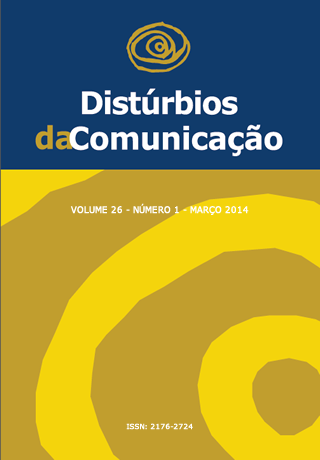Characterization of habits and vocal symptoms of radio presenters
Keywords:
dysphonia, voice disorders, occupational health, symptoms, voice.Abstract
Objective: characterize the vocal habits and symptoms of radio broadcasters. Methods: observational, descriptive, cross-sectional sample which comprised 31 speakers, of both sexes, with 28 men and three women, belonging to six radio transmission mode with AM and FM, in a city located in the interior of Paraná . All participants answered a questionnaire composed of 30 objective questions about habits, healthy and harmful, and vocal symptoms. Results: the average number of symptoms was 2,13. The highest occurrence of healthy habits was that of “drinking room temperature water” (n=25;80,60%) and the deleterious were “cough or phlegm” (n=11;35,5%) and “speaks in strong intensity “(n=11;35,5%). Most radio broadcasters do not practice sports (p<0,001), had no need to modify the standard for vocal work in the area (p=<0,001), did not present breathing problems (p=<0,001) and did not have vocal problems diagnosed (p=<0,001). As the amount of harmful habits increases, the number of symptoms also is increased (p=0,001). We also noticed that radio broadcasters who have had specific training have a higher amount of healthy habits (p=0,021). Individuals who changed the voice to be able to work with voiceover are in the profession for longer time than the subjects who did not modify the vocal pattern (p=0,047). Conclusion: the average of symptoms reported by radio broadcasters is low. Nevertheless, the adoption of harmful habits can trigger vocal alterations, making it important the work of vocal health promotion with this population.Downloads
Metrics
Downloads
Published
Issue
Section
License
Copyright (c) 2014 Priscilla D. Molin, Maíra da Silva, Ana P. Chuproski, Juliana F. M. Galli, Ana P. Dassie-Leite, Vanessa Veis Ribeiro

This work is licensed under a Creative Commons Attribution 4.0 International License.









